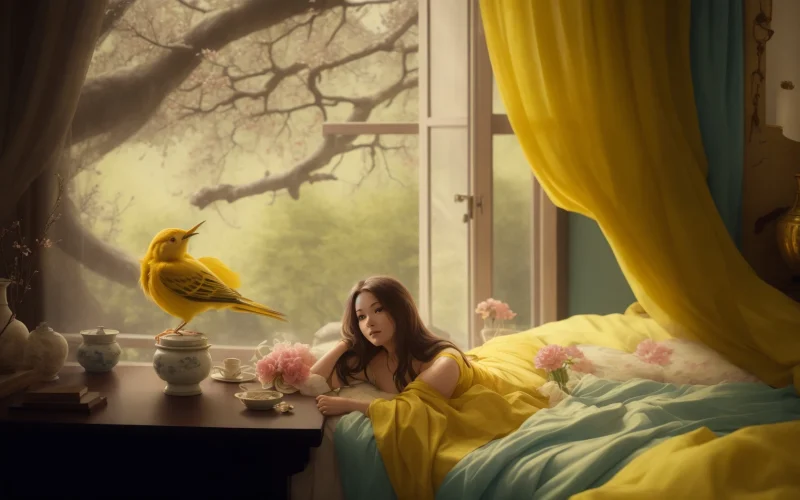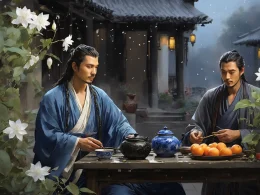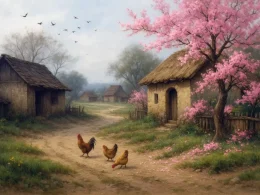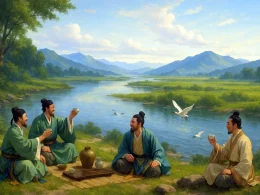Drive the orioles away, All their music from the trees. When she dreamed that she went to Liao-hsi Camp To join him there, they wakened her.
Original Poem
「 春怨 」
打起黄莺儿,莫教枝上啼。
啼时惊妾梦,不得到辽西。
Interpretation
This poem was likely composed during the turbulent frontier wars of the Tang Dynasty, portraying a young wife's profound longing for her husband stationed far away in Liaoxi. With remarkable economy of language, the poet captures the quiet suffering of ordinary lives disrupted by war. Though brief, it stands as a masterpiece of Tang "boudoir lament" poetry.
First Couplet: "打起黄莺儿,莫教枝上啼。"
Dǎ qǐ huáng yīng ér, mò jiào zhī shàng tí.
Shooing the golden oriole away,
Don't let it sing on the branch today.
The opening action seems casual yet conceals deep emotion. The oriole, normally a welcome herald of spring, becomes an intruder here. This反常behavior reveals complex feelings: the wife fears the bird's song will disrupt her precious dream.
Second Couplet: "啼时惊妾梦,不得到辽西。"
Tí shí jīng qiè mèng, bù dé dào liáo xī.
Its song would wake me from dreaming,
Of reaching Liaoxi in my dreaming.
The revelation comes gently - the dream is her sole means of "visiting" her distant husband. The oriole threatens not just sleep, but her fragile emotional sustenance. The lines ache with unspoken loneliness, their apparent simplicity belying profound pathos.
Holistic Appreciation
The poem's brilliance lies in its subtlety. Through the tiny act of shooing a bird, it unveils a world of longing. The wife complains not of her husband's absence nor her own suffering, but only fears a disrupted dream - this restraint makes her loneliness more piercing. Ending abruptly after "Liaoxi," the poem achieves resonant silence where words might fail. Without mentioning war directly, every line breathes its consequences: separation, fragile hopes, and quiet despair.
Artistic Merits
Mastering the Tang aesthetic of "small scenes, profound meanings", the poem uses the oriole and dream as vessels for unspoken grief. The closing line "not reaching Liaoxi" lingers with heartbreaking resonance. By connecting nature's sounds (the bird's song) to human emotion (the fragile dream), the work fuses scene and sentiment perfectly. Its apparent simplicity belies exquisite craft - each word polished to luminous clarity.
Insights
This miniature epic reminds us that profound emotions often whisper rather than shout. The wife's protective gesture toward her dream mirrors the vulnerability of all who wait through war's disruptions. Beyond battlefront casualties, the poem exposes war's quieter casualties: broken connections, suspended lives, and the private sorrows of those left behind. Its enduring power lies in honoring love's quiet persistence amid absence - a message that transcends centuries to speak to all separated hearts.
Poem translator
Kiang Kanghu
Jin Changxu(金昌绪) born and died in unknown years, he was a native of Yuhang (present-day Hangzhou, Zhejiang Province) in the Tang Dynasty. There is no detailed record of his life, and only one of his poems has been handed down, "A Spring Sigh".











